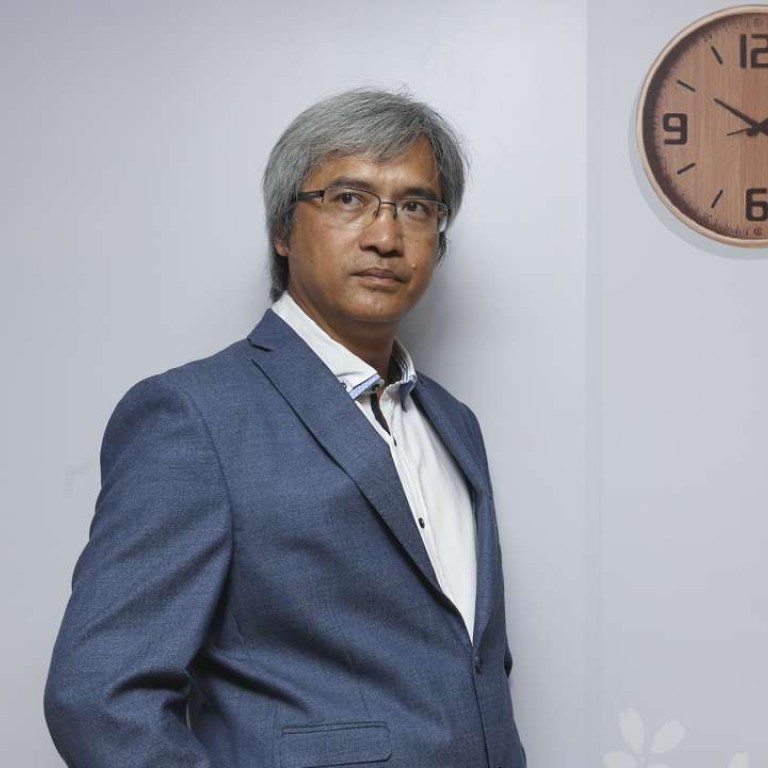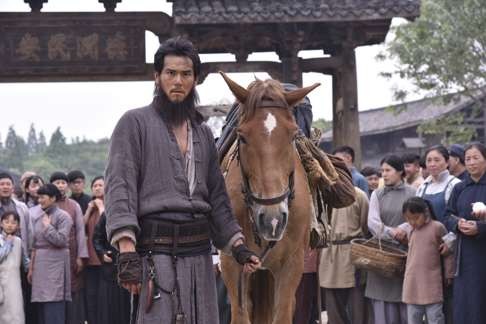
For Call of Heroes, Benny Chan summons his inner Akira Kurosawa and Sergio Leone
Hong Kong film director talks about his new film, which transposes the story of a 1960s western into the Chinese wuxia world of chivalrous warriors
Steadfast though he may be to dismiss any intention, Benny Chan Muk-sing can do little to dissuade his more imaginative viewers from seeing Call of Heroes as an allegory of Hong Kong’s recent political predicament.
“I believe that every audience member should have his own opinion, and I’m not going to force them to think in one way or another,” he says of his film, set in China’s Republican period.

After the cold-blooded son (played by Louis Koo) of a powerful warlord murders three innocent people just for fun, the righteous sheriff (Lau Ching-wan) of the fictional town of Pucheng vows to bring him to justice – only for the ordinary townsfolk to insist on the opposite, for fear that this unnecessary bid for the moral high ground will bring an end to their peaceful way of life.
“In the many films that I have watched since I was young – whether they’re the Shaw Brothers and Golden Harvest productions, or Hollywood and Japanese films – it is more or less the same story whenever characters are made to confront the bad guys,” says Chan, whose film plays like it has transposed the story of a 1960s western into the Chinese wuxia world of chivalrous warriors.
“If people feel that this story is similar [to what’s happening in reality], it’s a matter of timing. To be very honest, in the films we watched in the past, it’s always either the landlords or the corrupt officials who were bullying the people; that has always been the case. How should the hero help people survive? This is a very mainstream kind of creative impulse.”
To be fair, it would be straightforward for a seasoned audience to spot the cultural influences behind Call of Heroes. Once he decided to make a period film, Chan’s mind was settled on channelling the stories he fell in love with as a kid: from the spaghetti western films directed by Sergio Leone and starring Clint Eastwood, to the Japanese film and television series Kogarashi Monjiro and Zatoichi in the 1970s.

Alongside the duel between Lau and Koo’s characters, Call of Heroes was conceived as an origin story of Eddie Peng Yu-yan’s character Ma Feng, a wandering swordsman who recovers his heroic spirit in the terror-stricken town he randomly enters. As preparation, Chan asked the actor to study two of Akira Kurosawa’s samurai classics, Yojimbo (1961) and Sanjuro (1962), to learn from Toshiro Mifune’s portrayal of a free-spirited hero.

“It was my decision to shape Peng’s character into a knight-errant in this vein,” Chan offers. “In the first half of the film he’s a pseudo-hero – he’s avoiding the world and reluctant to deal with reality, instead merely looking on as a bystander. Towards the end of the film, he will have conquered his state of confusion and become a hero.”
If the box office results end up satisfying Chan’s investors, the director is eager to develop this into a film series revolving around Peng’s character. “I see Call of Heroes as the first chapter of the character’s journey,” says Chan. “I’m quite greedy at heart; I hope we can make more sequels if this proves to be a success. In Chinese cinema, few people are making this type of knight-errant film today.”
His efforts to enliven a declining genre is emphatically helped by the participation of martial arts film legend Sammo Hung Kam-bo as action director. “There are maybe two masters still working today in this industry, and ‘big brother’ Hung is one of them,” says Chan. “He’s a treasure. Very few people could match his experience in making wuxia films. The newer directors certainly couldn’t replicate his style.”

Although Chan has long been championed as one of Hong Kong’s best action film directors – having garnered five best director nominations at the Hong Kong Film Awards for what are essentially genre exercises (1996’s Big Bullet, 2003’s Heroic Duo, 2004’s New Police Story, 2008’s Connected, and 2013’s The White Storm) – this is, remarkably, the first time that he has collaborated with Hung.
Ironically, Peng has had far more experience working with Hung, having fought against him onscreen in Rise of the Legend (2014) and appeared briefly in his recent directorial effort, The Bodyguard . “They are like father and son,” says Chan with a chuckle. “Peng is a very obedient actor, so much so that he ended up doing a record 53 takes, over two days, for a complicated fight scene early in the film.”

While Peng takes the spotlight, and action actor Wu Jing contributes in the role of Peng’s comrade-turned nemesis, Lau Ching-wan deserves credit for ably pulling off his first martial arts role in a very long time. The actors’ contribution is all the more impressive when one considers the fact that Call of Heroes is a retro wuxia film in which stunt work and wire-fu are overwhelmingly preferred over computer effects.
“I enjoyed the experience of making this film a lot,” says Chan. “It is different from my past films in that it has clearly incorporated the style of Hung – apart from the Benny Chan element, there’s a Sammo Hung component to the film as well. I was not in the least concerned about the fight scenes – I left them all to ‘big brother’ Hung. You could say that the two of us created this wuxia world together.”
For years, Chan has been saying in interviews that he wishes to make a non-action drama some day, only to come back with his next action flick in a couple of years. When I bring this up, the director begins by drawing my attention to the dramatic scenes in Call of Heroes. “If you watch closely enough, you’ll see that I have put more of an emphasis on them,” he says.

After going on about how he explores his characters’ inner thoughts and family background in the action-packed film, and how he wouldn’t necessarily have done so in his previous cop thrillers, Chan reveals that he has in fact finished shooting “a heart-warming family film titled Meow”, which is about to enter its editing phase ahead of a 2017 release.
“And that’s not an action film,” he says, grinning brightly. Let it be known that Benny Chan is making a comedy that imagines pet cats as aliens from outer space.
Call of Heroes opens on August 18
Want more articles like this? Follow SCMP Film on Facebook

